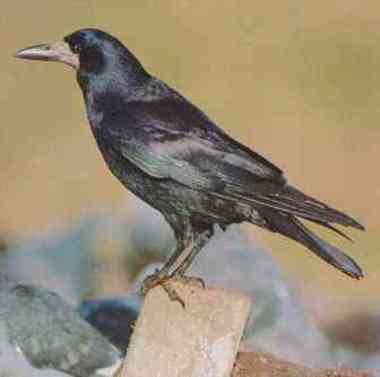This is not a poem about gardens or even, really, about Nature with a capital "N," but it seems fitting in this season of dying gardens and increasingly grey skies, when everything–lungs, arteries, possibilities–can feel constricted.
Since we don’t have rooks in the U.S., this poem deserves a photograph of a crow, which we do have, or at least of rain, but Montana seems to have skipped autumn this year, leaping straight from the almost summer-like temperatures that greeted us when we returned from Newfoundland in late September to the snow that now blankets the ground. I therefore have no rain to show you, and even the crows, which at times in summer drive me mad, appear to have fled. So I can offer only this photo of a rook, cadged off the Web.
Both here and in all the other photographs I found, the rook appears much blacker than crows do, glossier, more irridescent. Which makes sense, given what Plath does with it in the poem.
Image from Rooks and Crowsby Natalie Jacobs.
Black Rook in Rainy Weather
On the stiff twig up there
Hunches a wet black rook
Arranging and rearranging its feathers in the rain–
I do not expect a miracle
Or an accident
To set the sight on fire
In my eye, nor seek
Any more in the desultory weather some design,
But let spotted leaves fall as they fall
Without ceremony, or portent.
Although, I admit, I desire,
Occasionally, some backtalk
From the mute sky, I can’t honestly complain:
A certain minor light may still
Lean incandescent
Out of kitchen table or chair
As if a celestial burning took
Possession of the most obtuse objects now and then —
Thus hallowing an interval
Otherwise inconsequent
By bestowing largesse, honor
One might say love. At any rate, I now walk
Wary (for it could happen
Even in this dull, ruinous landscape); sceptical
Yet politic, ignorant
Of whatever angel may choose to flare
Suddenly at my elbow. I only know that a rook
Ordering its black feathers can so shine
As to seize my senses, haul
My eyelids up, and grant
A brief respite from fear
Of total neutrality. With luck,
Trekking stubborn through this season
Of fatigue, I shall
Patch together a content
Of sorts. Miracles occur.
If you care to call those spasmodic
Tricks of radiance
Miracles. The wait’s begun again,
The long wait for the angel,
For that rare, random descent.
Sylvia Plath
I too walk "ignorant/ /Of whatever angel may choose to flare/ Suddenly at my elbow;" don’t all of us? The best we can do is, like Plath, to "walk/ Wary, (for it could happen/ Even in this dull, ruinous landscape)." I love, for some reason, that word "wary," as if she were on guard against what she most hopes for.
I’m not as depressed as the speaker here, thank goodness; I hope for considerably more than to "Patch together a content/ Of sorts." Yet during this past week, the second since my sister’s death, I kept thinking of this poem, and once I’d found and re-read it, it put me back in touch with my grief, which already seemed stale. It’s hard to mourn properly someone you haven’t seen in years.
So I am grateful, in a way, for this grief, and for the poem that let me feel it; this poem is for me one of "those spasmodic/ Tricks of radiance" of which it speaks: a minor miracle.


 Subscribe to RSS feed
Subscribe to RSS feed



I’m not really a fan of Sylia Plath but I am moved by what you have made of her poem here.
Rooks are much more sociable than crows and live in large, noisy colonies.
I suppose they should sound mournful but they don’t. I think it’s because the noise calls you to look up into the trees and it’s hard to feel ‘down’ when you are looking up.
(I’m not being sentimental here or metaphoric – I really find that to ‘look up’ physically raises my spirits.)
Esther Montgomery
ESTHER IN THE GARDEN